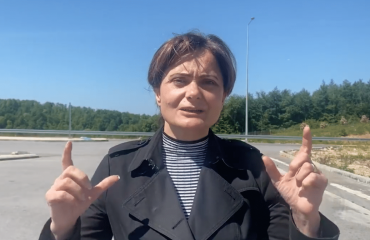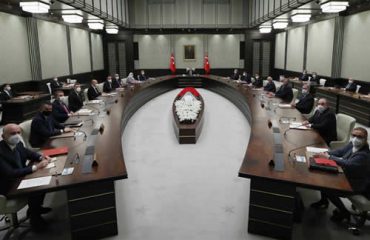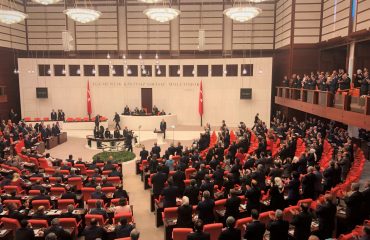

Republican People’s Party (CHP) leader Kemal Kılıçdaroğlu told journalist Muharrem Sarıkaya late on August 7 on private broadcaster HaberTürk that he favors metropolitan mayors from this main opposition party to continue “for the second term”.
This response was interpreted as Kılıçdaroğlu blocking the way for İstanbul Ekrem İmamoğlu and Ankara Mayor Mansur Yavaş to run for president in the election scheduled for 2023.
It is an apt comment. Kılıçdaroğlu had previously said he could be a candidate of the Nation’s Alliance, which he established with IYI Party leader Meral Akşener, in case a public opinion builds up in this direction. With these words, he actually aimed to prevent the debate on the probable presidential candidacy of İmamoğlu and Yavaş within the CHP. It was natural for the mayors not to come forward if there was a possibility that the chairman might also run for the seat. Kılıçdaroğlu now takes this discourse one step further, showing that he wants to close that chapter.
So, why does the CHP leader want to block the way of İmamoğlu and Yavaş, who are seen to have caught and passed President Tayyip Erdoğan in the opinion polls?
Both politicians brought a new understanding to municipalism. It is important that the tenders initiated by Yavaş are made transparently and that İmamoğlu finds the resources to carry out the construction of 10 subways at a time despite credit barriers. Seeing that such moves are being appreciated by the public, President Tayyip Erdoğan asked mayors from his ruling Justice and Development Party (AKP) to make tenders transparent, and called on the party organization to launch a campaign against the opposition municipalities’ embracing and taking the credit for the projects they started. In brief, both mayors have gained the popularity that exceeds the cities they govern and the CHP base. So let’s repeat the question. Why does the CHP leader want to block the debate that one of the two mayors will be the presidential candidate of the Nation Alliance?
An easy explanation for this might be that Kılıçdaroğlu has already blocked two successful mayors for the sake of his own candidacy. However, delving into the backstage of politics, you come across other balances and other reasons.
Istanbul or Ankara may fall into the hands of the AKP
The leading reason for Kılıçdaroğlu to close the presidential candidacy book for the mayors is that the AKP and the Nationalist Movement Party (MHP), its election ally in the People’s Alliance, hold the majority of the Metropolitan Municipality Councils in both İstanbul and Ankara.
If İmamoğlu or Yavaş run for the top seat whether in 2023 or a snap election in 2022, they will have to resign from their posts prematurely. In the Turkish election system, city councils elect a candidate to replace the resigning mayors. It would be naive to expect the majority of the AKP and MHP to elect another CHP candidate as the mayor for the sake of being fair. It is certain that a politician from the AKP would place the mayoral seat in Istanbul or Ankara, which they lost with a big gap, and this would be a gift from the winner, with the gift of the winner.
The biggest concern of both the CHP and the IYI Party circles on the way to the elections is that one of the municipalities of Istanbul or Ankara will be handed over to the AKP with their own hands because the mayor wants to become president. They are concerned that this would have consequences, that would exceed to defeat in presidential election.
IYI Party sources have also raised such concerns but the CHP circles politely cite “Karayalçın example,” avoiding offending Murat Karayalçın, a respected social democrat. He ran for Ankara mayor in the 2009 local elections, failing to make it with 31.5% of all votes.
This is why the CHP executives are concerned.
Why Karayalçın example?
Murat Karayalçın was elected the Ankara Mayor from the Social Democratic Populist Party (SHP) in the 1989 local elections. His victory, along with Nurettin Sözen’s win in Istanbul, triggered an enthusiastic mood among the opposition similar to the one after the election wins of İmamoğlu or Yavaş in 2019.
Karayalçın was a sympathetic and successful mayor. He accelerated his urban efforts with the foreign loans he found in a short time. Karayalçın was later elected as the chairman of the SHP after Erdal İnönü withdrew at the SHP congress in 1993. He resigned from the mayor seat and became the deputy prime minister and foreign minister in the DYP-SHP coalition led by Tansu Çiller.
This decision led to the disappointment of the Ankara voters. Then, in 1994, when the three left parties, CHP, SHP and DSP, entered the elections with their own candidates, Melih Gökçek from the Welfare Party (RP) made use of the gap and his 23-year rule began in Ankara. Likewise, in Istanbul, three left-wing parties insisted on their own candidates, Recep Tayyip Erdoğan from RP was elected the mayor. This was how Erdoğan’s road to presidency began.
Kılıçdaroğlu’s concern not to offend the voters of Istanbul or Ankara and not to let them feel let down also has a share in his decision.


